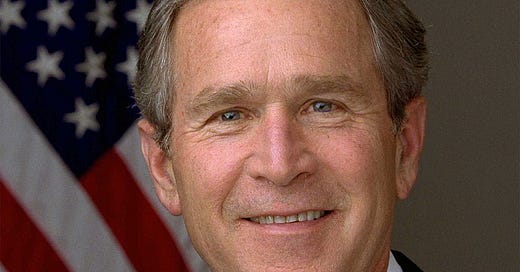Soapbox: Historians' Presidential Rankings are Useless
[Trivia: What titles from two volumes of William Blake’s poetry were later adopted as titles for two U2 albums?]
Occasionally historians are surveyed for their rankings of US Presidents, in order of “success” of “greatness” or something, and the results gets news or academic attention. This is unfortunate because these rankings, purported to come from reliably knowledgeable scholars and represent a broad swath of opinion, are useless.
You can only judge anything by holding it against a standard. In politics, people’s standards are wildly different and inextricable from debate. People’s ideas about personal virtue, the proper role and scope of government, and so on might have some considerable overlap but are often incompatible. And, at the risk of repeating a point I keep circling back to, knowing more about history and research don’t validate your opinions of those things more than other people’s. The most I could say is that they might inform your ideas of what’s realistic, politics being a practical art. But at the end of the day, these rankings are the product of applying specific historical individuals and their actions against standards and norms. Even if we expect historians to be on firm and detailed footing with the former (being aware of even Carter’s high points like deregulating beer production to pave the way for craft beer, having knowledge at all about presidents like Millard Fillmore and Warren Harding, etc.), their general principles are as up for debate as anyone’s.
So when they publish these rankings, they are telling us far more about what they would like to see in a President and what they believe government should look like, rather than giving us an authoritative assessment about the Presidents.
But “authoritative assessment” is the typical presentation of these opinions. See, for example, Siena College’s publication from January 2006:
Experts: Bush Presidency Is A Failure
Little Chance To Improve Ranking.
“Experts.”
Yes, the upshot is that professional academics have a far-Left view of what the government is supposed to look like. That is immediately visible in their bottom-line survey results.
A sampling from Wikipedia:
W: “Although public opinion of Bush has improved since he left office, his presidency has generally been rated as below-average by scholars.”
Obama: “Rankings by scholars and historians, in which he has been featured since 2010, place him in the middle to upper tier of American presidents.”
The Donald: “Scholars and historians rank Trump as one of the worst presidents in American history.”
But what’s at work here is something more than generic “bias.” The enterprise is a goofy one, subject to any other argument’s disagreements about values and philosophy.
And again, that’s being charitable about it. Let’s revisit that Bush headline from Siena. Here’s what they had to say about this man.
The Siena survey asked the experts –744 professors responded – this question: “George W. Bush has just finished five years as President. If today were the last day of his presidency, how would you rank him? The responses were: Great: 2%; Near Great: 5%; Average: 11%; Below Average: 24%; Failure: 58%.”
The experts were also asked, “In your judgment, do you think he has a realistic chance of improving his rating?” Two-thirds (67%) responded no; less than a quarter (23%) responded yes; and 10% chose no opinion or not applicable.
“While time is needed to fairly and accurately gauge how well any president ranks with his predecessors, George W. Bush starts with a ranking that could hardly be lower,” said Thomas Kelly, professor emeritus of American studies at Siena College.
In an ideal environment, this project would need to be deeply qualified. But as it’s actually executed, it’s hard to look at the treatment of George W. Bush (58% “failure” say “the experts”; 67% “no realistic chance to improve”; “ranking could hardly be lower”) and not label this a motivated political enterprise:, amounting to “the current Right-wing President is the worst.” This present-tense-focus is a Machiavellian take on the White Queen’s line from Alice’s adventures Through the Looking-Glass: “The rule is, jam to-morrow and jam yesterday—but never jam to-day.” You can be as benevolent and fulsome about someone absent as you like, just so long as the Present is the target of your sincere efforts.
It’s a human impulse to pit things against one another. But at least in an argument, you could wind up tangling with someone over those general principles themselves. Receiving these rankings from on high like some authoritative Dixi just debases popular the conversation.
And this is before we even get into the slate of all the Presidents whom the average American has (totally fairly) forgotten the existence of. Or, as this guy put it:
It is also not clear that the absolute rankings have great overall significance, especially for the middling presidents. Gerard Baker, US editor for The Times, writes, "the 42 American presidents fall into a well-established, Bell-curve or normal distribution on a chart – a handful of outstanding ones, a handful of duds, and a lot of so-sos. I couldn't, in all honesty therefore, really say that number 13 on the list is that much better than number 30."
“Adequate, forgettable, and occasionally regrettable” indeed.
~
Answer: Songs of Innocence (from which we get “The Tiger”—1789; 2014) and Songs of Experience (1794; 2017).



